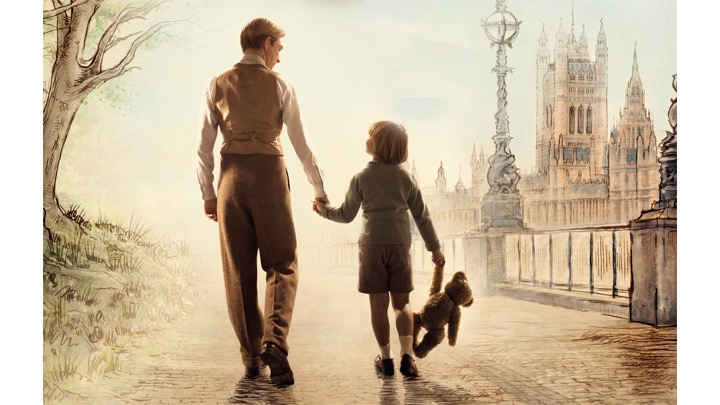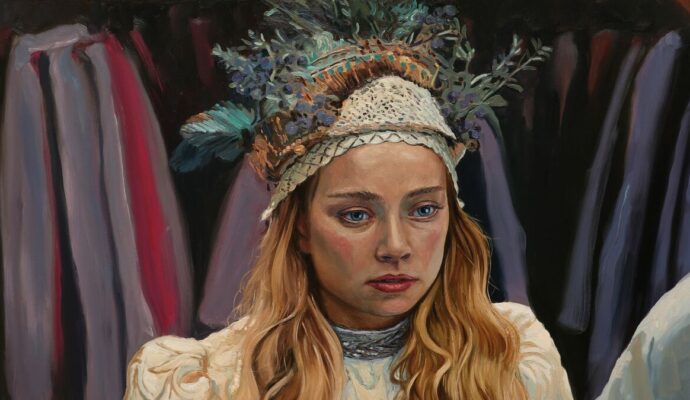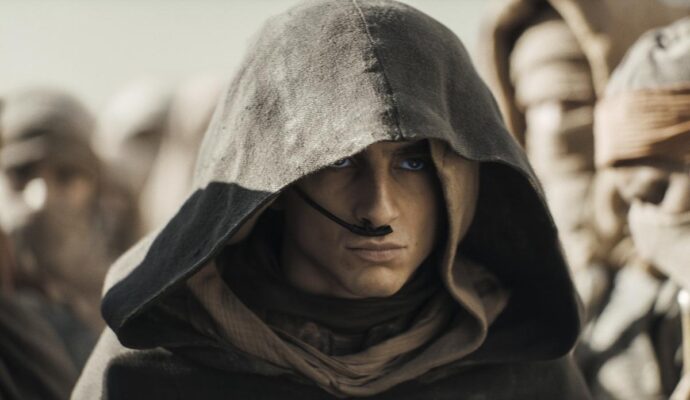“Goodbye Christopher Robin” – The name Christopher Robin should quickly resonate with anyone who has watched a Winnie the Pooh television special, film or read one of A.A. Milne’s (Domhnall Gleeson) children’s novels. Friends with Winnie the Pooh, Christopher Robin is a human character in these tales, but he also doubles as the real-life son of A.A. Milne, and director Simon Curtis (“My Week with Marilyn” (2011), “Woman in Gold” (2015)) explores this absorbing family story as well as the origin of an exceedingly popular and lovable literary bear.
Curtis takes us inside the Milne household in Sussex, UK, and although this beautiful, countryside home holds plenty of space, he thoroughly taps into and reveals the close dynamics between A.A., his wife, Daphne (Margot Robbie), Christopher Robin (Will Tilston), and their nanny, Olive (Kelly Macdonald). A.A. (aka Alan, Blue) brought so much joy to the world by scribing his series of Pooh books, but he unintentionally introduced life changing strife to Christopher Robin (nicknamed Billy Moon). Although Billy Moon did not physically run away during his youth, the Goodbye in “Goodbye Christopher Robin” is no less real, because his childhood – almost overnight – disappeared.
Prior to the family’s move to the country, Gleeson and Robbie effectively embrace their roles as Blue and Daphne and offer rich context for this wealthy, prominent couple who regularly engage in London’s social pleasantries, just after World War I. Blue – a very successful playwright – quickly establishes his struggle with post-traumatic stress, and Curtis emphasizes Milne’s internal churn with key close-ups of his face that literally fill the big screen, at least with an imagined 4:3 format. (Incidentally, Curtis effectively repeats similar close-ups with Billy Moon.) Daphne, meanwhile, wishes that her husband would place the war behind him and welcome their happy existence of a life filled with friends, parties, drinks, and dancing.
With the war recurrently entering his mind, Blue does wish to literally or physically dance in London any longer. With a new home in Sussex and the birth of Billy Moon, Blue and Daphne introduce ingredients for a new type of happiness and the inspiration for several Winnie the Pooh books.
Beautifully filmed, Curtis offers a gorgeous backdrop of the Milne property, complete with a large backyard, an adjacent woods comprising of loosely-spaced, established trees and colorfully-dotted rolling hills that would easily induce inspiration for Claude Monet or Pierre-Auguste Renoir. With a wondrous environment, buckets of sunshine (yes, apparently sunshine exists in England) and a wide-eyed little boy’s imagination, Milne runs towards Winnie the Pooh stories, rather than cowering from his aforementioned demons.
Regrettably, Blue and Daphne pull back from their duties as parents, as Olive tends to Billy Moon a majority of the time. Macdonald and Tilston’s onscreen relationship is particularly filled with joy and sweet nanny/child chemistry. Both actors are instantly likable, and while Macdonald holds an expressive strength and gentle touch, Tilston exudes an ever-present kindness, curiosity and a Teflon-like resiliency against his parents’ frequent absence. That resiliency, however, begins to erode for different reasons.
For several key reasons, “Goodbye Christopher Robin” hugely succeeds. First and foremost, Curtis shepherds a nurturing environment for the four principal actors to engage in the nuances of family. Dads of the 1920s did not actively partake in raising their children, and Gleeson balances this mindset while also showing Blue’s love for Billy Moon. Meanwhile, Robbie delivers an aristocratic air to Daphne who does not wish to be bothered by mundane motherhood tasks, but does affectionately display her playful side and genuine care for her son. In addition to a warm, motherly affection for Billy Moon, Macdonald’s Olive acts as the moral compass for the household, and Tilston shines with altruism and innocence in the title role.
In a recent interview, Curtis said, “(Tilston) is a magical kid, and I was lucky to have him in the film.”
He’s right.
While the film works as a collective character study and biopic, it also tenders wonderful, organic moments of Winnie the Pooh discoveries, like the naming of the beloved animal characters and the shaping of the willy nilly silly old bear himself, and one might find it impossible to keep from smiling during these well-placed surprises.
The film also carries angst and worry, emerging from the riches and fame of Blue’s famous books. “Goodbye Christopher Robin” contains no villains, but only human beings laboring through the game of life. Even surrounded by success, luxury and good intentions, parents can make mistakes and learn from them. This makes A.A. Milne’s own family story his most important.
⭐⭐⭐ 1/2 out of ⭐⭐⭐⭐
Image credits: Fox Searchlight Pictures; Trailer credits: Movieclips Trailers




